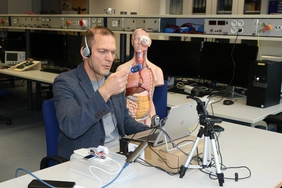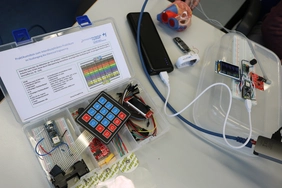"Internship to go" is the name of the practical exercise that has so far been unique at Technische Hochschule Ingolstadt (THI) and is offered in the Bio-Electrical Engineering degree programme. Prof. Dr. Georg Passig, Dean of Studies at the Faculty of Electrical Engineering and Information Technology, where the course is located, developed it together with his colleagues. The special feature: The interdisciplinary practical course combines different subjects and lets students do research from home thanks to the experimental boxes.
Already in the first year of study, the students develop a pulse oximeter in the "practical course to go". To do this, they have to combine knowledge from medical physiology, such as the importance of oxygen saturation in the blood, with specialist skills from physics (including determining the wavelengths when shining a light through the body), from electrical engineering in building the measuring sensors, to mathematics and information technology in evaluating the signals and programming the device. In a joint course, the technical background is clarified, then the students get down to experimenting. This takes place - according to the students' choice - in one of the well-equipped laboratories at the THI or at home. Everything the students need is handed out in an experiment box.
Playful approach to complex topics
The playful approach to the often complex subject areas goes down well with the young people, as Prof. Dr. Georg Passig says: "Precisely because they have the equipment available at home, it leads to a lot of voluntary preparation and follow-up time."
The introduction of new degree programmes enables the THI to implement new teaching concepts. "We have had good experience for years lending out experimental boards for practical courses through our library. So it made sense to assemble all the accessories in small boxes right from the start in this practical course, which the students get from us for a whole year," says Passig. And the "internship to go" has another advantage: if, due to Corona restrictions, studying has to take place online again, completing the practical exercise at home under video supervision is no problem.
High practical relevance
The students very much appreciate the high practical relevance and the diverse mix of medical and technical topics, as student Lena Gleichmar explains. That's why she deliberately chose the Bio-Electrical Engineering programme. And her fellow student Nadine Eberl adds: "The interdisciplinary internship with the interesting experiments gives deeper insights into the topics already covered, which are deepened through practical experimentation. A great thing!"
The German-language, medical technology degree programme Bio-Electrical Engineering started in the 2020/21 winter semester. Alongside Computational Life Sciences and Life Science Management, it is one of three innovative degree programmes with which the THI is expanding its range in the field of life sciences. The aim is to combine subject-specific qualifications in engineering, computer science or economics with basic medical training. In this way, graduates are equipped for the promising professional field in the area of healthcare and lifestyle technologies.
Find out now: All important information on the life sciences degree programmes can be found at www.thi.de/studium/studium-an-der-thi/gesundheit-life-sciences/.




![[Translate to English:] Logo Akkreditierungsrat: Systemakkreditiert](/fileadmin/_processed_/2/8/csm_AR-Siegel_Systemakkreditierung_bc4ea3377d.webp)








![[Translate to English:] Logo IHK Ausbildungsbetrieb 2023](/fileadmin/_processed_/6/0/csm_IHK_Ausbildungsbetrieb_digital_2023_6850f47537.webp)


